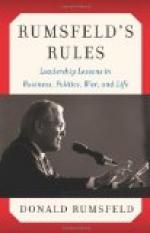Any plan which will unite Sir George White’s force, or the bulk of it, with that of Sir Redvers Buller on the Tugela will simplify the whole problem of the War. Lord Roberts is preparing for an advance in force from the Orange River, which will sooner or later transfer the centre of gravity to the western theatre of War, in which the British troops will not be confronted by the difficulties of an unknown or very imperfectly known mountainous region. The movements now taking place in the Cape Colony are the preliminaries to that advance. The method, the only right method, is to use the reinforcements that have arrived—the sixth and seventh divisions—to secure a preponderance first at one point and then at another, instead of distributing them evenly over the whole area and the various points of contact. The idea would seem to be, first, to strengthen General French until he has crushed the Boer force with which he is dealing, then to use his troops to secure the defeat of the Boers who are opposing Sir William Gatacre, and then to cross the Orange River with three divisions and deal a blow against the Boer army that is now between the Riet River and Kimberley. This plan of beating in detail the Boer forces in the western theatre of war, if carried out so as to lead in each case to a crushing defeat of the Boers, would be the prelude to a collision between the main Boer army and a British force its superior in every respect. The first certain evidence that some such idea is at the foundation of the new operations may be hailed as the beginning of victory. For the present it is enough to know that the departure of Lord Roberts from Cape Town augurs the opening of an energetic campaign with that unity of direction in a strong hand which is the first element of success in war.
A COMMANDER
February 15th, 1900
In war, as in other great enterprises, the first element of success is unity of direction in a strong hand. The reason is that whenever the co-operation of large numbers is involved the needful concentration of purpose can be supplied only by the head man, the leader or director. Concentration of purpose means in war the arrangement in due perspective of all the various objectives, the selection of the most important of them, the distribution of forces according to the importance of the blows to be delivered, of which some one is always decisive. To the decisive point, then, the bulk of the forces are directed, and at other points small forces are left to make shift as well as they can, unless, indeed, there is a superabundance of force—not a common phenomenon.
The same principle of concentration prescribes that action when once begun should, at any rate at the decisive point, be sudden, rapid, and continuous. These fundamental ideas are illustrated by the practice of all the great commanders, and there is perhaps no better definition of a great commander than one whose action illustrates the simple principles of war. Lord Roberts is once more revealing to his countrymen the nature of these principles. The tangled mass of the war has suddenly become simplified, and there is clearness where there was confusion.




